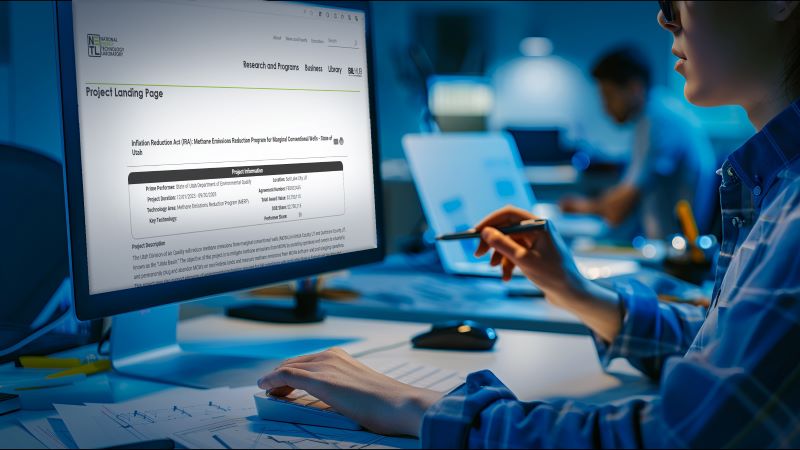Methane Emissions Reduction Program
Technical & Financial Assistance
Aspects of MERP’s Technical & Financial Assistance
The Inflation Reduction Act (IRA) provides new authorities under Section 136 of the Clean Air Act to tackle methane emissions from the oil and natural gas sector through the creation of the Methane Emissions Reduction Program (MERP). This program will help reduce emissions of methane and other greenhouse gas (GHGs) from the oil and gas sector and will have the co-benefit of reducing non-GHG emissions. In keeping with the Administration’s Justice40 Initiative, the program will also reduce emissions from oil and natural gas infrastructure in or near overburdened communities.
Through the Methane Emissions Reduction Program, the U.S. Department of Energy’s (DOE) National Energy Technology Laboratory (NETL), DOE’s Office of Fossil Energy and Carbon Management (FECM), and U.S. Environmental Protection Agency (EPA) are partnering to provide up to $1.36 billion in financial and technical assistance through an interagency agreement to improve methane monitoring and reduce methane and other greenhouse gas emissions from the oil and natural gas sector.
NETL has a distinguished history of delivering solutions for an environmentally sustainable and prosperous energy future. Under the Methane Emissions Reduction Program, NETL is:
- Building upon DOE and EPA’s extensive technical and energy management experience to identify strategic research, development, and demonstration opportunities that will accelerate the reduction of methane emissions across the oil and natural gas industry.
- Leveraging NETL’s Research Innovation Center (RIC) core technical competencies to provide technical assistance to a diverse set of stakeholders and facilitate the implementation of commercially available and next generation methane monitoring and mitigation technologies.
The Methane Emissions Reduction Program includes the following financial assistance opportunities:
- An $850 million funding opportunity announcement (FOA-3256) to help small oil and natural gas operators reduce methane emissions and transition to available and innovative methane emissions reduction technologies, while also supporting partnerships that improve emissions measurement and provide accurate, transparent data to impacted communities.
- $350 million (FOA-3109) in formula funding was awarded to 14 eligible states to assist oil and natural gas well owners and/or operators as they reduce methane emissions from low-producing conventional wells on nonfederal lands through voluntary, permanent well plugging.
The Methane Emissions Reduction Program includes the following technical assistance:
- EPA and DOE will provide technical assistance to help states, industry, and other partners implement cost-effective solutions that reduce methane leak emissions. The agencies will work with partners to implement and prioritize best practices and mitigation decision-support tools across the broader oil and natural gas sector. This technical assistance will also ensure efforts are fully aligned with the needs of local communities and help inform key decision-makers of mitigation opportunities across states, industry, and other partners.
To learn more about the EPA managed regulatory aspects of Methane Emissions Reduction Program please visit the EPA website.
Explore the Methane Emissions Reduction Program
Want to stay up to date with the latest MERP updates?
Applying for MERP Funding
Upcoming Events
- Coming Soon
Contact Us
- For technical and financial assistance contact us at MERP@netl.doe.gov.
- For policy and regulatory questions contact us at MERP@epa.gov.












